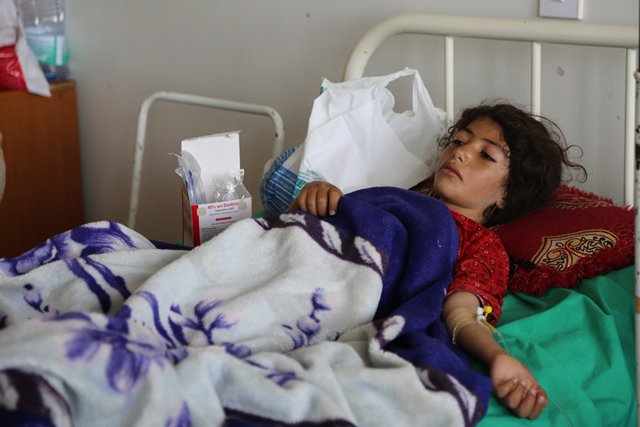International Organization: Cholera Epidemic Threatens Millions of Yemenis

Yemen Monitor/ Newsroom
The hunger-fighting organization stated on Friday that the humanitarian response to the cholera crisis in Yemen is suffering a lack of funding.
The organization stated in a statement that, after five years since the deadliest cholera outbreak in modern history, the poorest country in the Arabian Peninsula is witnessing a concerning increase in cholera cases.
Since March 14, more than 8,700 cases have been recorded, especially in the northern provinces of the country, adding that critical levels of malnutrition, ineffective healthcare systems, and poor water quality provide fertile ground for this disease.
The organization explained that in a country torn apart by conflict and economic deterioration, all the causes are in place for the spread of the epidemic.
In Yemen, nearly 20 million people are still in need of humanitarian assistance, with 17 million Yemenis suffering from food insecurity, while humanitarian funding has decreased significantly.
It stated that cholera in Yemen is characterized by watery diarrhea, sudden and painless vomiting. Although the disease is easily treatable, it can lead to death within hours if left untreated.
It confirmed that children under five, pregnant and lactating women, individuals over 60 years old, and displaced people are most at risk.
Of the 1.3 million pregnant and lactating women and 2.2 million children under five suffering from malnutrition in Yemen are most vulnerable to cholera infection, as malnutrition and cholera form a vicious cycle.
Daniel Niebiera, Director of Action Against Hunger’s office in Yemen, stated that malnutrition weakens human immunity, increasing the risk of disease. Additionally, cholera causes significant loss of water and nutrients, reduces appetite, and also affects immunity.
He explained that Action Against Hunger (ACF) and its partners ACTED and Mercy Corps will implement an emergency response project in at least five high-risk provinces (Al-Mahwit, Dhamar, Sana’a, Al-Hodeidah, Taiz) across the country.
The intervention aims to implement water, sanitation, and hygiene activities to prevent the spread of cholera at the community level and provide operational support to health centers to save lives.
Daniel Niebiera warned that “humanitarian actors have limited resources at their disposal, and rapid mobilization of additional funds is necessary if humanitarian organizations are to contain the epidemic.”
He added that although the humanitarian coordination recognizes the need for a rapid response, limited capacities have delayed the cholera crisis alert, with no means of precise analysis and data.
On the other hand, the humanitarian response to the cholera crisis is suffering from a funding shortage, as is the case for comprehensive humanitarian response in Yemen. This year, funding from major donor agencies decreased by 40% compared to the previous year.
Specifically, the funding shortage forced the World Food Programme to announce a “temporary suspension” of the general food assistance program, affecting 9.5 million people suffering from food insecurity in northern Yemen.
As a result of this decrease in food aid, it is expected to deteriorate to emergency levels (Phase 4 of the Integrated Phase Classification) in several provinces under the authorities based in Sana’a until May 2024.

